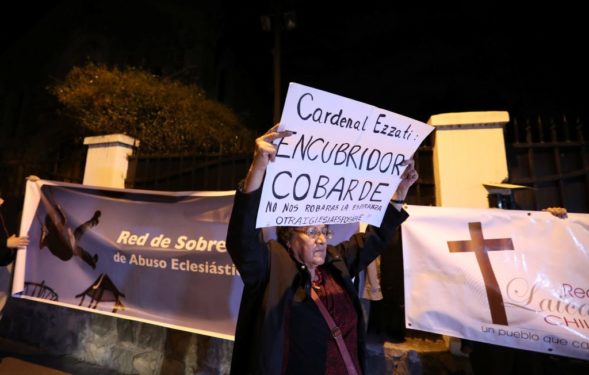By Inés San Martín

ROSARIO, Argentina – Almost a year to the day since Pope Francis’s troubled January 2018 visit to Chile, a group of Chilean bishops is returning the favor, visiting Rome on Monday to try to “strengthen communion” with the pontiff after a series of clashes that included Francis accusing Chilean prelates of covering up clerical sexual abuse and of destroying evidence.
One of the bishops who worked to make Monday’s meeting happen told Crux the encounter was requested by the Chileans, to “bring him up to date on what we’ve done since his visit,” and to try to “rebuild the relationship between the Chilean bishops’ conference and the Holy See, making it more formal and structured.”
Requesting to remain unnamed, he said Saturday that the objective is to once again have “formal ties” between the government of the global Church and that of Chile, because the structural bond “is broken.”
“Each bishop, when they go to Rome, meets with the pope, some of them with the various Vatican dicasteries, but there’s no formal conversation, the ordinary relationship with the Apostolic See is broken” the bishop said. “This needs to be addressed to strengthen communion.”
Things between Chile and the papacy have been tense since Pope Francis summoned every Chilean bishop to Rome last May to address an ongoing institutional crisis due to various cases of clerical sexual abuse, some which go back many decades but which continued to be mishandled.
At the end of that meeting, every bishop presented their resignation to Pope Francis in a two-page document defined to Crux as “pastoral in tone” and with no real canonical value. Experts say this means that despite a codicil of canon law stipulating the pope has three months to accept a bishop’s resignation before it becomes void, in the case of Chile the resignations were set up in a way that allows the pope to take as long as he needs.
As a result, several bishops who took a deep breath after the three-month deadline expired are not yet out of the woods. Among them is Cardinal Ricardo Ezzati, Archbishop of Santiago, who at 77 has presented his resignation to Pope Francis twice, once in May and again when he turned 75.
Cardinal Ezzati is one of eight Chilean bishops who’ve been subpoenaed by the civil prosecutor’s office on charges of cover-up. He’s also one of five who will meet Pope Francis on Monday. The list, all members of the permanent commission of the Chilean conference, also includes Bishop Santiago Silva president of the commission; vice president Archbishop Rene Rebolledo Salinas; Bishop Fernando Ramos Perez; and Bishop Juan Ignacio Gonzalez.
Bishop Silva too has been subpoenaed, and for this reason he decided to skip a Feb. 21-24 meeting of every president of a bishops’ conference called by Pope Francis. Instead, Bishop Ramos will attend.
Since his trip to Chile on Jan. 15-18 last year, Francis went from publicly defending disgraced Bishop Juan Barros, the first of seven bishops whose resignations he accepted since May, to acknowledging that he made “serious errors of assessment and perception” in the case of Bishop Barros, who has long been accused of covering up for his mentor, former priest Fernando Karadima.
“I recognize … that I have made serious errors of judgement and perception of the situation, especially due to a lack of truthful and balanced information,” Pope Francis wrote in a letter to the Chilean bishops released April 18.
In it, he also announced that he would be meeting a group of Chilean survivors of clerical sexual abuse. The letter was the result of an investigation conducted in the pope’s name by Maltese Archbishop Charles Scicluna and Spaniard Father Jordi Bertomeu, an official of the Congregation for the Doctrine of the Faith, which among other things deals with cases of abuse by priests.
After meeting with the pope in late April and early May, three survivors told reporters that he had “formally asked us for forgiveness, in his own name and on behalf of the universal Church.”
One of the survivors said he believed the pope hadn’t lied but had been badly informed. The survivor said Pope Francis had told him, “I was part of the problem, I caused this, and I apologize to you.”
Pope Francis then got tough with Chile’s bishops. In a document leaked to the media, the pope told the bishops that removing people, though necessary, is not enough.
The problems facing the Chilean Church today are not solved by “addressing the concrete cases and reducing them to the removal of people; this – and I say this clearly – must be done, but it’s not enough, we must go further.”
According to Pope Francis, it would be “a serious omission” not to look into the roots and structures that allowed for the abuse – not only sexual abuses, but also abuses of power and conscience – to happen and to continue over time.
Sources with knowledge of the situation told Crux last November that during their general assembly some of the prelates expressed anger with the way Pope Francis has treated them, wanting to go to Rome to address it.
However, the Chilean bishop who spoke on background this Saturday said the reason for the visit is not to voice resentment but to try to re-build the bond, although, he said, this isn’t to say that some of the prelates aren’t hurt.
“If some of us weren’t upset, we’d all be Martians,” he said.
